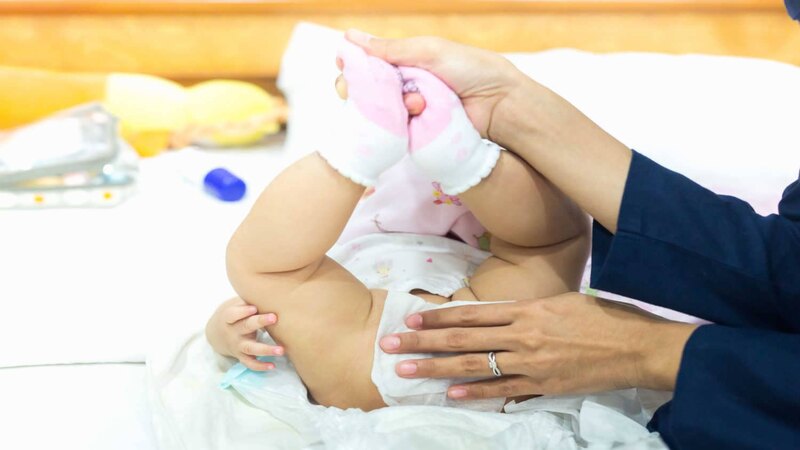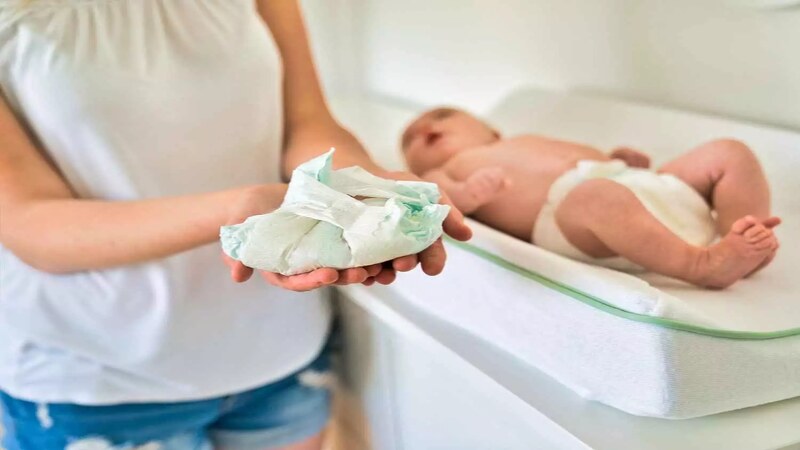
As your little one grows, you witness various stages of development that bring in a lot of happiness and excitement for you. One such stage is when the first tooth starts erupting. Your little one may show signs of teething anytime between three to eighteen months. Often, you may see that teething and diarrhea go hand in hand which leaves you to wonder if teething can cause diarrhea in babies
It is a fact that teething can bring a lot of discomfort to your baby. Diarrhea is one such discomfort associated with teething. Once babies start teething, they move around and put things in their mouths that may be loaded with germs that upset their stomachs. Read on to know how teething can lead to diarrhea and tips to deal with it.
Can Teething Cause Diarrhea In Babies?
A lot of people may believe that teething causes diarrhea. However, this is not true. No studies in the field of medical science prove that teething triggers diarrhea in babies [1]. Since teething occurs at a stage where most babies are prone to all kinds of illnesses and allergies, they just happen to coincide with diarrhea symptoms and thus the myth developed that teething causes loose motion.
When babies are teething, they automatically reach out for anything that they can see and try putting it in their mouth. You have to bear in mind the fact that a lot of these objects are not clean and may contain traces of bacteria in them. These bacteria are the culprits that normally cause diarrhea in babies and thus the link between diarrhea and teething has evolved. So, make sure that whatever your baby puts into his or her mouth during teething is disinfected or cleaned thoroughly to prevent your little one from contracting diarrhea.
Furthermore, excessive drooling during teething, beginning solid foods, and depletion in the antibodies acquired from the mothers, can be a cause of contracting infection, and making the stools loose giving a perception of babies having diarrhea [2]. But keep in mind that there is no scientific research about any direct link between teething and diarrhea.
How Long Does Teething Diarrhea Last?

Symptoms of diarrhea include loose stools that usually occur during teething, though there is no direct link between teething and diarrhea. Several reasons mentioned above have an indirect link between the two. The symptoms of diarrhea usually last a few days, maybe 5 to 6 days, and often not a cause of great concern. However, if diarrhea persists even after a week, then it is best to seek medical help for further evaluation. Since diarrhea can be caused by several other reasons.
Signs And Symptoms Of Teething
Teething can be quite an uncomfortable phase marked by restlessness uneasiness and sometimes crying too. Here are some common signs and symptoms associated with teething in babies [3].
- Drooling: One of the major tell-tale signs that your little one is teething is drooling. It will appear like a drool faucet has been installed in your little one’s mouth.
- Biting: You will find your precious darling chewing on anything and everything that they can reach out to. Be it your thumb, fingers, toys, or even your breast.
- Refusing Food: Very often your little one refuses to have food during the period when they are teething.
- Crankiness: Babies become extremely cranky and fussy while teething and are quite difficult to console too during this period.
- Swollen Gums: The little one’s gums appear swollen during the teething period. Usually, you can also see the tooth’s outline in those bulging gums.
- Disturbed Sleep: Your little one may not be sleeping peacefully throughout the night, once they start teething. They wake up often and start crying for no reason at all during the night-time.
- Diarrhea: Mild diarrhea is yet another common sign of teething in babies.
- Slight Fever: Due to the inflammation in the gums, some babies can also develop a mild temperature during teething.
Other Causes of Diarrhea in Babies

There are several other causes of diarrhea in babies. These include [4]:
1. Bacteria and viruses
Poor hygiene and exposure to contaminated items can result in your baby contracting a viral or bacterial infection that can lead to diarrhea.
2. Food sensitivity
Certain foods can be difficult for the babies to digest leading to indigestion and acid reflux, resulting in diarrhea.
3. Food allergies
Allergy to foods and formula milk can pose a risk of serious stomach infection due to undeveloped intestines.
4. Certain medications
Antibiotics can irritate your baby’s stomach and intestinal lining causing diarrhea.
5. History of travel
The use of contaminated water during travel can lead to diarrhea in adults and babies.
6. No obvious cause
Sometimes babies may develop diarrhea for no reason. As long as they as active and do not have fever there is nothing to be worried about.
How To Deal With Baby’s Teething Diarrhea?

Although there is no need for any kind of treatment for teething diarrhea, if you find that your baby has been having diarrhea for more than a couple of days with more than five motions a day, you have to start acting immediately.
1. Changing Your Baby’s Diet
Lower the quantity of juice that you feed your baby. Instead, concentrate more on breast milk and baby formula during this period. It is important to increase his fluid intake to avoid dehydration. Including veggies like carrots, bananas, and potatoes in his diet will help to control teething diarrhea. Cereals containing rice and plain rice water also help in stopping teething diarrhea and its effects. Stopping milk products would also be beneficial in controlling teething diarrhea.
2. Sanitizing Reachable Objects And Toys
One thing that your little one does during that teething period is grab anything and everything that they can reach and put it into their mouth. This can cause infections. To avoid this, make sure you keep an eye on what your little one is grabbing and also sanitize all the toys. You can also provide them with a teething ring or a teether toy that they can chew on.
3. Consulting Your Pediatrician
If you find that the teething symptoms do not disappear, the best course of action would be to consult your pediatrician who will tell you what exactly needs to be done. He will suggest if any medicines are required to treat any viral or bacterial infection. Your little one mustn’t get dehydrated. So immediately contact your doctor if you find that diarrhea does not get better even after a couple of days.
Diaper Rash And Teething

Some babies also develop a diaper rash during teething time due to diarrhea they develop during this period [5]. Diaper rash can also be caused due to viral infections, antibiotic consumption, or digestive issues which also are reasons for diarrhea [6]. Using a diaper rash cream can to a great extent help in healing the rash quickly. Airing out those baby bums frequently will also help to cure the rash faster.
When Should You Consider To See A Doctor?
Diarrhea from teething should be reported to your doctor as soon as possible if it persists. Severe diarrhea for one day or mild to moderate diarrhea for more than two or three days. This aids in identifying the existence of any other illnesses that may be producing comparable symptoms, so that appropriate treatment may be given.
Sometimes specific medications may also be advised to treat the disease or eliminate the germs. Diarrhea might cause your newborn to get dehydrated, thus talking to your doctor is strongly advised.
We hope all the above-mentioned tips will help you deal with teething diarrhea and diaper rash when your little one begins teething. Your doctor will also be able to guide you as to how to deal with this effectively. So go ahead and ask your doctor what needs to be done once your little one begins teething. If you experienced loose motion while your baby was teething, do share your tips to deal with it in the comments section below.
FAQ’s
1. What Color Is Teething Diarrhea?
If your infant is breastfed, teething diarrhea may be yellow, mushy, runny, and occasionally lumpy. Conversely, if your infant is given formula milk, his feces are reddish to brown and have a thicker consistency during teething.
2. How Long Do Babies Have Diarrhea When Teething?
Diarrhea may be common in babies since they are prone to take things inside their mouths and contract an infection. However, do not worry since this can last only for a couple of days. If the symptoms of diarrhea fail to subside in a week, call your doctor immediately.
3. What Can I Give My Baby To Stop Teething Diarrhea?
You may want to try an oral rehydration solution if they are pooping a lot or refusing their milk. But most of the time their usual breast milk or formula is fine.
4. Can Teething Cause an Upset Tummy?
Teething can cause an upset tummy in babies. However, there is no direct link between the two. Teething causes gum soreness and discomfort which makes the babies put anything they get in their mouth that may carry bacteria and other harmful germs. This can lead to an upset stomach.
References
- Is teething associated with diarrhea? – [https://www.ncbi.nlm.nih.gov/pmc/articles/PMC1071026/#]
- Misconceptions and traditional practices towards infant teething symptoms among mothers in Southwest Ethiopia – [https://www.ncbi.nlm.nih.gov/pmc/articles/PMC6151031/]
- On teething symptoms – [https://www.ncbi.nlm.nih.gov/pmc/articles/PMC1125135/]
- Diarrhea – [https://www.ncbi.nlm.nih.gov/books/NBK448082/]
- Common Diaper Rashes & Treatments – HealthyChildren.org – [https://www.healthychildren.org/English/ages-stages/baby/diapers-clothing/Pages/Diaper-Rash.aspx]
- Diaper Dermatitis: A Survey of Risk Factors for Children Aged 1 – 24 Months in China – [https://journals.sagepub.com/doi/10.1177/030006051204000514]
